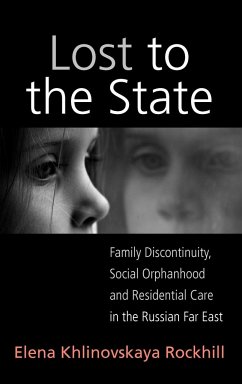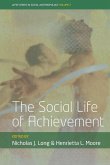Elena Khlinovskaya Rockhill
Lost to the State
Family Discontinuity, Social Orphanhood and Residential Care in the Russian Far East
Elena Khlinovskaya Rockhill
Lost to the State
Family Discontinuity, Social Orphanhood and Residential Care in the Russian Far East
- Gebundenes Buch
- Merkliste
- Auf die Merkliste
- Bewerten Bewerten
- Teilen
- Produkt teilen
- Produkterinnerung
- Produkterinnerung
Childhood held a special place in Soviet society: seen as the key to a better future, children were imagined as the only privileged class. That is why the rapid emergence in post-Soviet Russia of the vast numbers of social orphansA" or children left without parental care,A" children who have living relatives but grow up in residential care...
Andere Kunden interessierten sich auch für
![Ethnography in the Raw Ethnography in the Raw]() Brian MoeranEthnography in the Raw40,99 €
Brian MoeranEthnography in the Raw40,99 €![The Pursuit of Pleasurable Work The Pursuit of Pleasurable Work]() Trevor H. J. MarchandThe Pursuit of Pleasurable Work50,99 €
Trevor H. J. MarchandThe Pursuit of Pleasurable Work50,99 €![The Social Life of Achievement The Social Life of Achievement]() The Social Life of Achievement37,99 €
The Social Life of Achievement37,99 €![Almost, but Not Quite Bored in Pula Almost, but Not Quite Bored in Pula]() Andrea MatosevicAlmost, but Not Quite Bored in Pula123,99 €
Andrea MatosevicAlmost, but Not Quite Bored in Pula123,99 €![What Now What Now]() Cameo DalleyWhat Now39,99 €
Cameo DalleyWhat Now39,99 €![Feminist Responses to Injustices of the State and Its Institutions Feminist Responses to Injustices of the State and Its Institutions]() Feminist Responses to Injustices of the State and Its Institutions49,99 €
Feminist Responses to Injustices of the State and Its Institutions49,99 €![A Comparative Historical and Typological Approach to the Middle Eastern State System A Comparative Historical and Typological Approach to the Middle Eastern State System]() A Comparative Historical and Typological Approach to the Middle Eastern State System152,99 €
A Comparative Historical and Typological Approach to the Middle Eastern State System152,99 €-
-
-
Childhood held a special place in Soviet society: seen as the key to a better future, children were imagined as the only privileged class. That is why the rapid emergence in post-Soviet Russia of the vast numbers of social orphansA" or children left without parental care,A" children who have living relatives but grow up in residential care...
Hinweis: Dieser Artikel kann nur an eine deutsche Lieferadresse ausgeliefert werden.
Hinweis: Dieser Artikel kann nur an eine deutsche Lieferadresse ausgeliefert werden.
Produktdetails
- Produktdetails
- Verlag: Berghahn Books
- Seitenzahl: 400
- Erscheinungstermin: 21. Dezember 2010
- Englisch
- Abmessung: 240mm x 161mm x 26mm
- Gewicht: 762g
- ISBN-13: 9781845457389
- ISBN-10: 1845457382
- Artikelnr.: 30834923
- Herstellerkennzeichnung
- Libri GmbH
- Europaallee 1
- 36244 Bad Hersfeld
- gpsr@libri.de
- Verlag: Berghahn Books
- Seitenzahl: 400
- Erscheinungstermin: 21. Dezember 2010
- Englisch
- Abmessung: 240mm x 161mm x 26mm
- Gewicht: 762g
- ISBN-13: 9781845457389
- ISBN-10: 1845457382
- Artikelnr.: 30834923
- Herstellerkennzeichnung
- Libri GmbH
- Europaallee 1
- 36244 Bad Hersfeld
- gpsr@libri.de
Elena Khlinovskaya Rockhill was born in Russia and first trained as a Biologist. In 2004 she received her Ph.D. in Social Anthropology from Darwin College, Cambridge University. From 2004-2007 she worked as a Research Associate at the Department of Social Anthropology, Cambridge University. She was a 2007 Wenner-Gren Hunt Postdoctoral Fellow, and a PI for an ESF-funded international project 'Moved by the State: Perspectives on Relocation and Resettlement in the Circumpolar North' at the University of Alberta, Canada (2007-2010).
List of Figures and Tables
Acknowledgements
Notes on Transliteration
List of Acronyms and Abbreviations
Introduction
* The Scope of the Problem What is this Study About?
* Time Line: Soviet and Post-Soviet Notes on Methodology
* Theoretical and Conceptual Framework
PART I: BECOMING A SOCIAL ORPHAN
Chapter 1. A Brief History of Family Policy in Russia
* Pre-Revolutionary Shelters and the Concept of the Child
* The Soviet Period: Family Discontinuity and Children-out-of-Family
Chapter 2. The State as a Co-Parent
* Fieldsite: Magadan
* The Child Welfare Network
* Residential Care Institutions and their Functions
* Categories of the Family
* The Benevolent State and 'Good' Parents: Voluntary Placements and
Cooperation
Chapter 3. State and Family: Tilting the Balance of Power
* Neblagopoluchnye Parents: Tension between the State and the Family
* 'Inadequate Fulfilment of Parental Duties'
* Working with the Neblagopoluchnaya Family
Chapter 4. Parents Overwhelmed by the State
* 'Child Appropriation': The Case Study of Maria
* Court Hearings
* Deprivation of Voice and Disempowerment of the Parent
Chapter 5. Norms and Deviance
* The 'Best Interests of the Child': Moral Judgement of the Parent
* The Child's Biological Family: The Severance of Ties and 'Symbolic
Death' of Parents
* The Construction of Family by the State: A Society of Virtual Kin
PART II. BEING A SOCIAL ORPHAN
Chapter 6. The State as a Sole Parent
* The Rake's Progress: The Child's Journey through Residential Homes
* The Cosmology of Institutions
Chapter 7. The World of Social Orphans
* Experiencing Institutions: Narratives of Former Inmates
* Misha's Signposts of Institutional Life
* Unpacking Parent-Child Obligations: Dispersed Responsibility and
Accountability
* Two Worlds: Orphans and the Wider Society
PART III: POST-SOVIET OR SOVIET? SELF-PERPETUATION OF THE SYSTEM
Chapter 8. The Continuing Soviet Legacy: Paradoxes of Change and Continuity
* Childhood and Family Today: The Shifting Domains of Public and
Private Continuity of Practices and Attitudes
* 'Moral Panic': Current Descendants of Witchcraft
* Accusations and Show Trials
* Self-Perpetuation of the System
* Alternative Approaches
Chapter 9. The Post-Soviet Case in a Wider Context
Conclusion
* Modes of relatedness
* Power Asymmetry
Appendix I: List of Documents Supplied to the Court by the Guardianship
Department and the Baby Home in Maria's Case
Appendix II: Reminiscences of Two 'Bad' Childhoods
References
Glossary
Index
Acknowledgements
Notes on Transliteration
List of Acronyms and Abbreviations
Introduction
* The Scope of the Problem What is this Study About?
* Time Line: Soviet and Post-Soviet Notes on Methodology
* Theoretical and Conceptual Framework
PART I: BECOMING A SOCIAL ORPHAN
Chapter 1. A Brief History of Family Policy in Russia
* Pre-Revolutionary Shelters and the Concept of the Child
* The Soviet Period: Family Discontinuity and Children-out-of-Family
Chapter 2. The State as a Co-Parent
* Fieldsite: Magadan
* The Child Welfare Network
* Residential Care Institutions and their Functions
* Categories of the Family
* The Benevolent State and 'Good' Parents: Voluntary Placements and
Cooperation
Chapter 3. State and Family: Tilting the Balance of Power
* Neblagopoluchnye Parents: Tension between the State and the Family
* 'Inadequate Fulfilment of Parental Duties'
* Working with the Neblagopoluchnaya Family
Chapter 4. Parents Overwhelmed by the State
* 'Child Appropriation': The Case Study of Maria
* Court Hearings
* Deprivation of Voice and Disempowerment of the Parent
Chapter 5. Norms and Deviance
* The 'Best Interests of the Child': Moral Judgement of the Parent
* The Child's Biological Family: The Severance of Ties and 'Symbolic
Death' of Parents
* The Construction of Family by the State: A Society of Virtual Kin
PART II. BEING A SOCIAL ORPHAN
Chapter 6. The State as a Sole Parent
* The Rake's Progress: The Child's Journey through Residential Homes
* The Cosmology of Institutions
Chapter 7. The World of Social Orphans
* Experiencing Institutions: Narratives of Former Inmates
* Misha's Signposts of Institutional Life
* Unpacking Parent-Child Obligations: Dispersed Responsibility and
Accountability
* Two Worlds: Orphans and the Wider Society
PART III: POST-SOVIET OR SOVIET? SELF-PERPETUATION OF THE SYSTEM
Chapter 8. The Continuing Soviet Legacy: Paradoxes of Change and Continuity
* Childhood and Family Today: The Shifting Domains of Public and
Private Continuity of Practices and Attitudes
* 'Moral Panic': Current Descendants of Witchcraft
* Accusations and Show Trials
* Self-Perpetuation of the System
* Alternative Approaches
Chapter 9. The Post-Soviet Case in a Wider Context
Conclusion
* Modes of relatedness
* Power Asymmetry
Appendix I: List of Documents Supplied to the Court by the Guardianship
Department and the Baby Home in Maria's Case
Appendix II: Reminiscences of Two 'Bad' Childhoods
References
Glossary
Index
List of Figures and Tables
Acknowledgements
Notes on Transliteration
List of Acronyms and Abbreviations
Introduction
* The Scope of the Problem What is this Study About?
* Time Line: Soviet and Post-Soviet Notes on Methodology
* Theoretical and Conceptual Framework
PART I: BECOMING A SOCIAL ORPHAN
Chapter 1. A Brief History of Family Policy in Russia
* Pre-Revolutionary Shelters and the Concept of the Child
* The Soviet Period: Family Discontinuity and Children-out-of-Family
Chapter 2. The State as a Co-Parent
* Fieldsite: Magadan
* The Child Welfare Network
* Residential Care Institutions and their Functions
* Categories of the Family
* The Benevolent State and 'Good' Parents: Voluntary Placements and
Cooperation
Chapter 3. State and Family: Tilting the Balance of Power
* Neblagopoluchnye Parents: Tension between the State and the Family
* 'Inadequate Fulfilment of Parental Duties'
* Working with the Neblagopoluchnaya Family
Chapter 4. Parents Overwhelmed by the State
* 'Child Appropriation': The Case Study of Maria
* Court Hearings
* Deprivation of Voice and Disempowerment of the Parent
Chapter 5. Norms and Deviance
* The 'Best Interests of the Child': Moral Judgement of the Parent
* The Child's Biological Family: The Severance of Ties and 'Symbolic
Death' of Parents
* The Construction of Family by the State: A Society of Virtual Kin
PART II. BEING A SOCIAL ORPHAN
Chapter 6. The State as a Sole Parent
* The Rake's Progress: The Child's Journey through Residential Homes
* The Cosmology of Institutions
Chapter 7. The World of Social Orphans
* Experiencing Institutions: Narratives of Former Inmates
* Misha's Signposts of Institutional Life
* Unpacking Parent-Child Obligations: Dispersed Responsibility and
Accountability
* Two Worlds: Orphans and the Wider Society
PART III: POST-SOVIET OR SOVIET? SELF-PERPETUATION OF THE SYSTEM
Chapter 8. The Continuing Soviet Legacy: Paradoxes of Change and Continuity
* Childhood and Family Today: The Shifting Domains of Public and
Private Continuity of Practices and Attitudes
* 'Moral Panic': Current Descendants of Witchcraft
* Accusations and Show Trials
* Self-Perpetuation of the System
* Alternative Approaches
Chapter 9. The Post-Soviet Case in a Wider Context
Conclusion
* Modes of relatedness
* Power Asymmetry
Appendix I: List of Documents Supplied to the Court by the Guardianship
Department and the Baby Home in Maria's Case
Appendix II: Reminiscences of Two 'Bad' Childhoods
References
Glossary
Index
Acknowledgements
Notes on Transliteration
List of Acronyms and Abbreviations
Introduction
* The Scope of the Problem What is this Study About?
* Time Line: Soviet and Post-Soviet Notes on Methodology
* Theoretical and Conceptual Framework
PART I: BECOMING A SOCIAL ORPHAN
Chapter 1. A Brief History of Family Policy in Russia
* Pre-Revolutionary Shelters and the Concept of the Child
* The Soviet Period: Family Discontinuity and Children-out-of-Family
Chapter 2. The State as a Co-Parent
* Fieldsite: Magadan
* The Child Welfare Network
* Residential Care Institutions and their Functions
* Categories of the Family
* The Benevolent State and 'Good' Parents: Voluntary Placements and
Cooperation
Chapter 3. State and Family: Tilting the Balance of Power
* Neblagopoluchnye Parents: Tension between the State and the Family
* 'Inadequate Fulfilment of Parental Duties'
* Working with the Neblagopoluchnaya Family
Chapter 4. Parents Overwhelmed by the State
* 'Child Appropriation': The Case Study of Maria
* Court Hearings
* Deprivation of Voice and Disempowerment of the Parent
Chapter 5. Norms and Deviance
* The 'Best Interests of the Child': Moral Judgement of the Parent
* The Child's Biological Family: The Severance of Ties and 'Symbolic
Death' of Parents
* The Construction of Family by the State: A Society of Virtual Kin
PART II. BEING A SOCIAL ORPHAN
Chapter 6. The State as a Sole Parent
* The Rake's Progress: The Child's Journey through Residential Homes
* The Cosmology of Institutions
Chapter 7. The World of Social Orphans
* Experiencing Institutions: Narratives of Former Inmates
* Misha's Signposts of Institutional Life
* Unpacking Parent-Child Obligations: Dispersed Responsibility and
Accountability
* Two Worlds: Orphans and the Wider Society
PART III: POST-SOVIET OR SOVIET? SELF-PERPETUATION OF THE SYSTEM
Chapter 8. The Continuing Soviet Legacy: Paradoxes of Change and Continuity
* Childhood and Family Today: The Shifting Domains of Public and
Private Continuity of Practices and Attitudes
* 'Moral Panic': Current Descendants of Witchcraft
* Accusations and Show Trials
* Self-Perpetuation of the System
* Alternative Approaches
Chapter 9. The Post-Soviet Case in a Wider Context
Conclusion
* Modes of relatedness
* Power Asymmetry
Appendix I: List of Documents Supplied to the Court by the Guardianship
Department and the Baby Home in Maria's Case
Appendix II: Reminiscences of Two 'Bad' Childhoods
References
Glossary
Index








